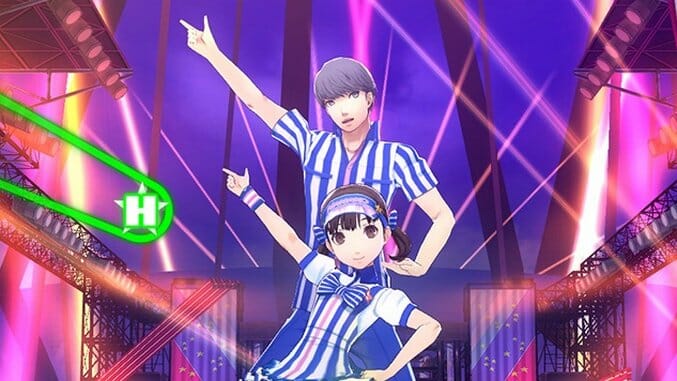Persona 4: Dancing All Night—Save the Last Dance For Me

It’s been almost seven years since we were first introduced to the cast of Persona 4, a septet of anime teens (and, uh, a bear) who journeyed to a world inside of the TV to solve a series of supernatural murders. Now, with the release of Persona 4: Dancing All Night, there are officially more games in the Persona series featuring this crew than without them. Between a duo of fighting games (Persona 4 Arena and Ultimax), a dungeon-crawler in the style of Etrian Odyssey (Persona Q), and now this rhythm-action game, one might raise an eyebrow when they hear that the next game in the series will be Persona “5”.
The simple explanation for Persona 4’s dominance of the series over the last seven years is this: There are a lot of people who love these kids, and we want to spend more time with them. There are a handful of game series that devote themselves to creating fictional friend groups of which the player feels they are a part, and these series create fierce loyalty in their fans: The Saints Row games do it, Mass Effect and Dragon Age do it, and since the release of Persona 3 in 2007, the Persona games have done it exceedingly well.
Persona 4: Dancing All Night is our last opportunity to spend some time with Yu, Yosuke, Chie, Yukiko, Kanji, Rise, Naoto and Teddie before we’re introduced to a new crew when Persona 5 is released next summer. The game is simultaneously a joyous celebration of the friendship these characters share and a clear indicator that Atlus is done with these characters, that there’s nowhere left to go with them narratively.
Dancing All Night follows a similar format to the two Persona 4 Arena games, (almost completely) bisecting its narrative and its gameplay. Though the game offers you the option to jump right in and dance, there is a “story mode” that’s presented in the form of a visual novel. Like the visual novels in Arena and Ultimax, it introduces some original characters and attempts to craft a narrative framework for why its characters are fighting/dancing. Also like the visual novels in Arena and Ultimax, it would be about twice as effective if it was half as wordy. It doesn’t help that the premise of Dancing All Night is far and away more absurd than that of its fighting game brethren: Yu and company find themselves once more transported to a supernatural world populated by Shadows, but this time their only means of defeating them is by expressing their feelings through the power of dance!
Believe it or not, it’s possible to make a premise like that work. I’ve played that game. It’s called Elite Beat Agents, and it’s one of the funniest and most charming rhythm games I’ve ever played. But Elite Beat Agents takes its absurdity and bakes it into its very code. Dancing All Night decides to play it straight-faced, and it just… falls flat. The characters talk (at great length) about the importance of expressing oneself and being true to one’s own feelings, and fervently hope that their dancing conveys to their antagonists the intensity of their beliefs, but none of it ever manages to achieve any serious emotional weight. There’s nothing at stake for any of the characters we already know and love, and only one of the new characters (Rise’s up-and-coming rival idol Kanamin) is interesting enough for us to be excited to learn anything about. There are a couple of moments near the end of the VN where the trademark darkness of the Persona games manifests itself, and those are the highlights of the narrative, but otherwise the only real reasons to play through the story are the (characteristically) charming voice-acting performances and to unlock the last few songs in the rotation.
 Keep scrolling for more great stories.
Keep scrolling for more great stories.

